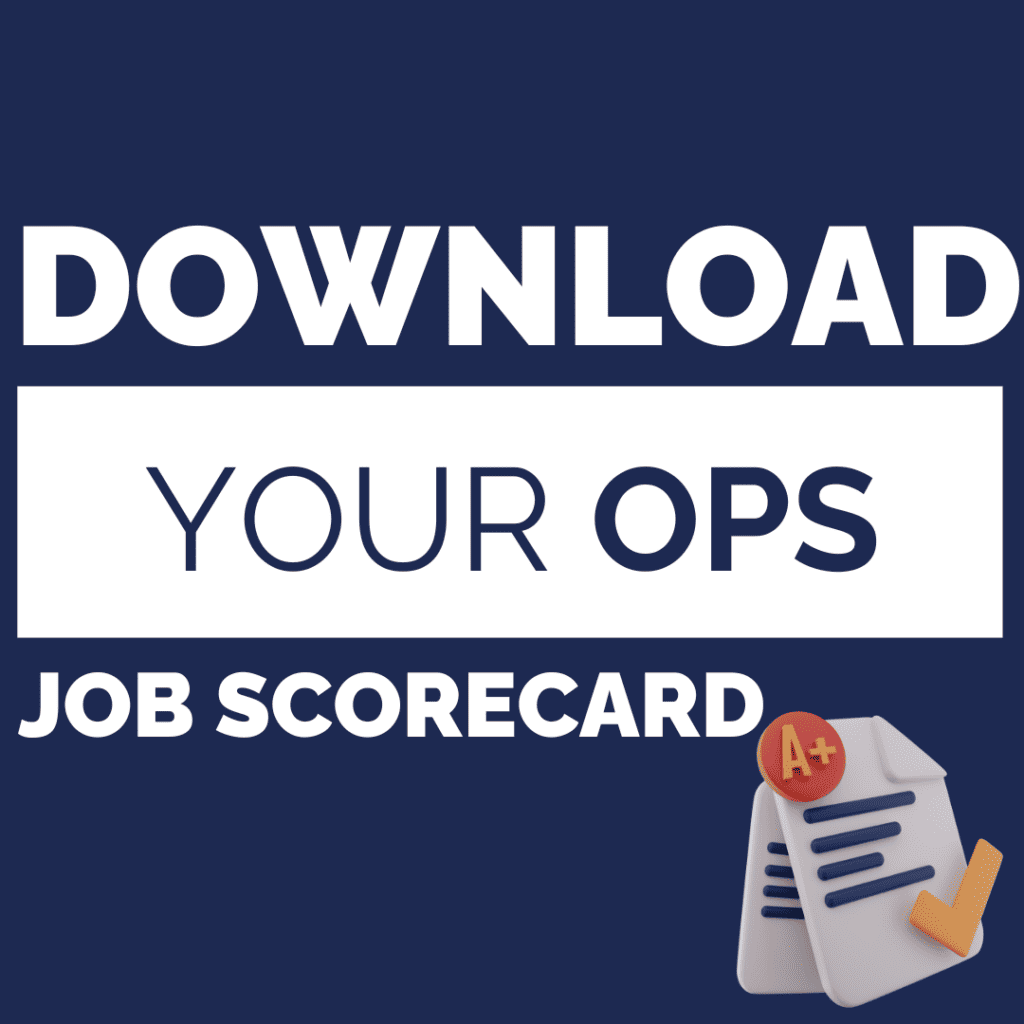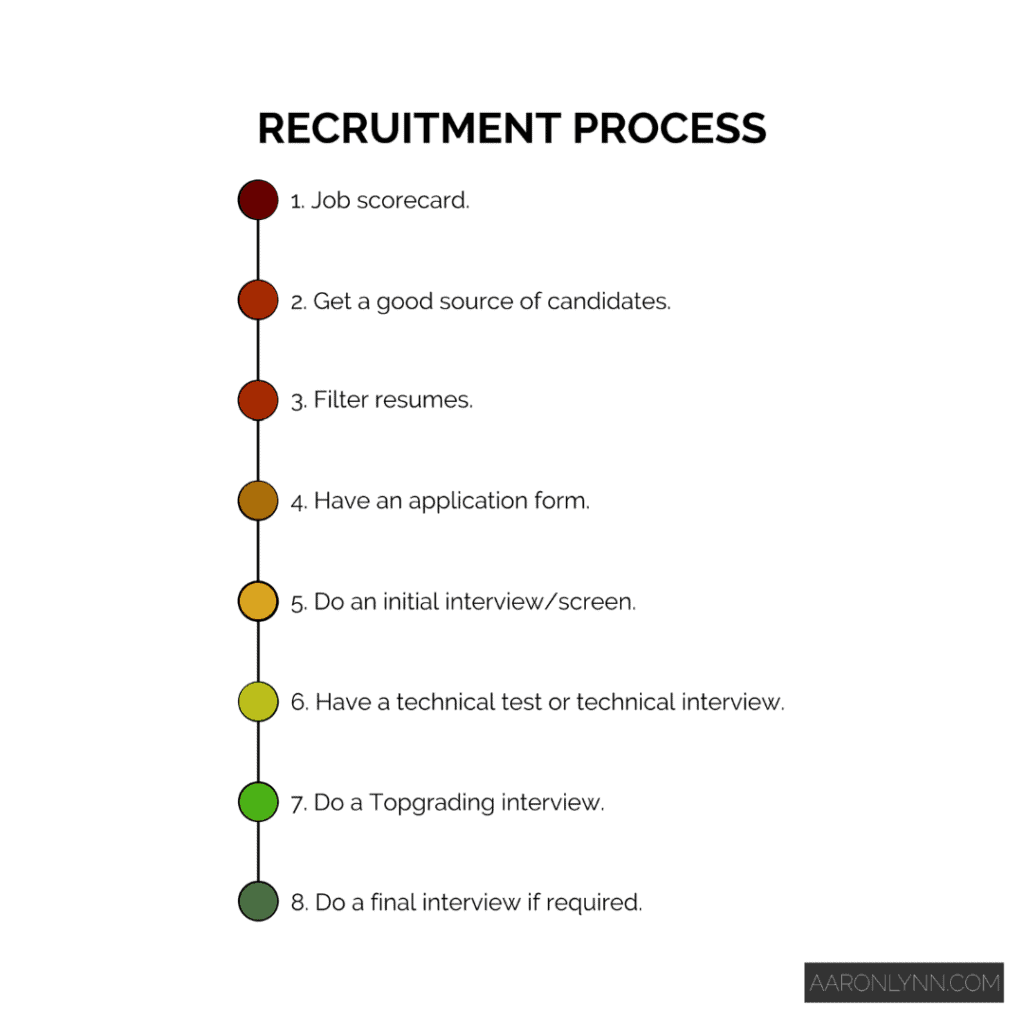
An extremely common question for business owners in the $500k+ a year range is how to hire an operations person.
This is because they want someone to take care of running the business, so they can either:
- Focus on a specific part that they like, be it thought leadership, business development or something else.
- Take some time off, finally.
So… how do you hire a “COO”, operations manager or operations person?
Signs You Actually Need an Ops Person

Here are the signs that you actually need an operations person in your business… and aren’t just burnt out or being lazy.
- You have 4+ people on your team.
- You are overwhelmed. You literally do not have enough time to do client delivery, rally the troops, take care of the administrative side (finances, payroll etc) and to set aside enough personal time in your life to make it all worthwhile.
- You feel like there’s a lack of organisation, structures, systems, and processes.
- You’re passing on growth opportunities constantly.
- There’s unclear or poor financial performance.
- You have team management problems like high staff turnover.
- There are operations items you don’t really understand or enjoy doing, like the finances.
If you’re experiencing half or more of the above… it’s time to hire an operations person.
Defining Operations

The first thing you need to do is to define what operations actually means.
This is because the term “ops” in business in a bit of a misnomer.
It actually refers to three different things:
- Client operations, which is delivery, fulfilment, client management and vendor management.
- Internal operations, which is finance, administration, data analysis, strategy execution, team management and legal/compliance.
- Technical operations, which is apps, software and technology management.
All three areas will have aspects of systems, people, technology, and processes involved.
Before you can hire an “ops person” you need to know which areas of operations you are hiring for and exactly what this person will do.
At a large company, the COO would take care of all these areas. But they also have a plethora of managers reporting to them to help with each of these areas.
To expect one person to take care of all of these areas in a small business is somewhat unreasonable — unless they are being compensated very, very well.
Speaking of which…
Compensation for Operations Managers and Coordinators
What should you pay your operations person?
This varies a lot.
If you are looking for a Western-based operations person who can handle client ops, internal ops and technical ops… expect to pay $10,000/month and up.
This person will essentially be running your business on your behalf, and would thus expect to be paid in line with what you take home yourself.
If they only handle 1-2 of these areas, then they may expect less.
If they are in the developing world, expect compensation to be $4,000/month and up.
Don’t Call Your Ops Person a COO

If you have a small business,1Say, under $20m a year. there is zero need to call your ops person a COO.
What you really need is someone to run your client ops, internal ops, and technical ops.
If you put out a job ad for a COO, they will expect COO-levels of compensation, i.e., $15,000-$20,000+ a month.
Instead, call them something more appropriate:
Operations Coordinator, or Operations Manager.
Why do entrepreneurs like to call this position, “COO”?
Because of ego.
Because they call themselves a “CEO” and think that their senior people then need to be a “CMO”, “COO” and so on.
The reality is, they are not CEOs. Having five team members does not make them a CEO. Coca-Cola is not headhunting them to be their CEO.
They are, however, founders and business owners — and that is not any less impressive.
Tip: Get External Ops Help First
One underutilised approach as you look to hire operations help is to engage an external consultant first.
What this means is instead of hiring an operations person and expecting them to:
- Run the business day-to-day,
- Build the systems, and
- Optimise the business all at the same time…
You hire an external systems consultant to help build your systems, streamline your processes, and then hand all that over to your new operations person.
What does this look like?

Here is how it looked for a luxury travel client I recently worked with.
We completed project work around streamlining their sales, recruitment, technology, and operations processes.
We then did a hiring project to source, interview and hire a general manager (client ops, internal ops and some tech combined).
I then facilitated the knowledge transfer to the new general manager.
The end result?
They added over $1.5m to their annual revenue — and the business owner can catch up on some sleep now.
Fractional Ops

Another alternative to hiring an operations manager full-time is to hire a Fractional COO.2In EOS they like to call this a “Fractional Integrator” though I find that the terminology confuses more than helps.
This is essentially an operations person who works for you part-time, but still gets everything done.
Doing this enables you to pick up top-notch talent at a fraction of the cost of a full-time hire.
So, you can bring onboard a $10,000+ a month ops person… for a fraction of that.
Just be clear exactly what kind of fractional operations person you are looking for. This works extremely well for internal and technical ops, less so for client ops.
I occasionally offer fractional COO services to select clients. More details here.
Recruiting an Operations Person
The recruitment process for an operations person is no different than for any other hire.
You begin with a job scorecard.
If you want a scorecard with objectives, accountabilities, and competencies for an operations person already filled in, you can grab it here:


You then source candidates through your network or recruiters.
I suggest doing screening interviews over Zoom, or asking for video cover letters in the worst-case.
You should then do in-person or Zoom tandem career history interviews, followed by a final interview with some of their to-be senior reports.
Start with many candidates, narrow it down, and then choose from the top three candidates.
Onboarding an Ops Person

Onboarding a senior operations person is a little different from onboarding a frontline employee.
Before they arrive, have as much of the tech and systems in place that will support their work — especially if they’re coming onboard to focus on client operations.
If they’re going to be focused on internal or technical operations, then they will likely reorganise and upgrade your systems when they start.
From there, you want to make sure that all the standard technical, account and administrative setup is complete.
On their first day, give them the company culture speech. Introduce them to everyone in the company.
Then sit down and discuss their KPIs and job scorecard, to set clear expectations.
Then comes training.
It’s valid to ask — how exactly do you train an operations person who is supposed to do many things?
Well, if there are specific systems or processes they will heavily use, training is warranted.
Otherwise, once recruitment is complete, but before they start, have a conversation with them. Tell them that they are coming into a senior role, and that the expectation for them to come up with an operational plan during their first few weeks.
Week 1 for them will be to acclimatise to how the company runs, and to start coming up with a plan — both for how to run the company, and how to execute operational improvements.
Week 2 is for them to discuss and refine the plan with you, while starting to run the day-to-day.
Week 3 onwards is execution.
At the level of an operations manager, they are expected to perform — not have their hand held.
That being said, you should do one-on-ones, coaching and mentoring with them as you would with any other team member.
Assessing Your Operations Person’s Performance

How and when do you assess an operations person’s performance?
The first time is at the end of their probation period.
The second will be ongoing, at the end of every quarter.
You should use the accountabilities and KPIs on their job scorecard to start, and supplement with company OKRs and their contributions towards them.
Assessing an operations person is actually very straightforward because their work affects the entire company, and is reflected in the company financials.
If you need a more holistic view, consider doing 360-degree feedback evaluations of their peers to create an all-round picture of how they work with the team, clients, and vendors.
Grab Your Pre-Filled Ops Job Scorecard
Want to speed up your search for an operations person?


Grab my job scorecard that has objectives, accountabilities, and competencies for an operations person filled in already:
What To Do Next
Start hiring your operations person.
Work out what they will do.
Give them an appropriate job title.
Determine compensation.
Define their role with a job scorecard. And grab the pre-filled scorecard above for a head start.
Get outside help to expedite the process.
Recruit them and onboard them.
And if you need help with any of this, reach out to me here.
- Say, under $20m a year.
- In EOS they like to call this a “Fractional Integrator” though I find that the terminology confuses more than helps.
